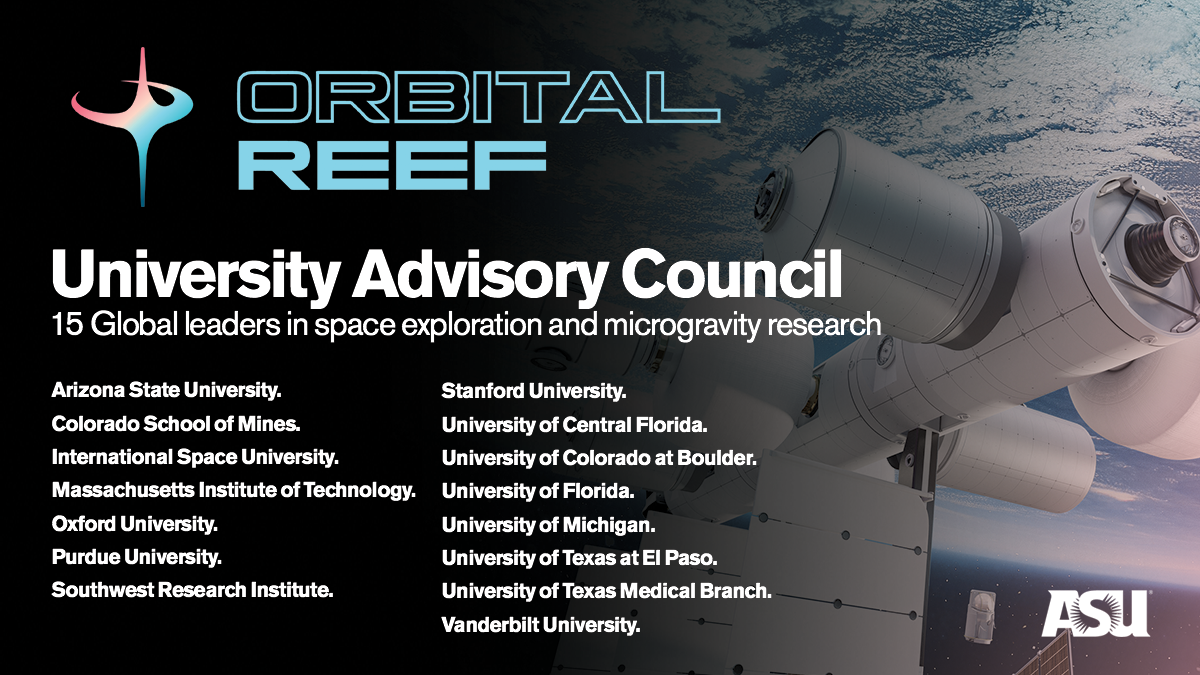Orbital Reef University Advisory Council advances planning for research on low Earth orbit space station

Pictured above: Lindy Elkins-Tanton, Alan Bentley, Dava Newman, Jessica Rousset, Erika Wagner, Simon Jackman, Kathleen Howell and Connor D’Arcy.
Arizona State University's Interplanetary Initiative convened a second meeting of the Orbital Reef University Advisory Council to advance its plans for stimulating and channeling academic research onto Orbital Reef in a manner that is accessible to new groups, reaches underserved sectors and is conducted under a robust ethical framework.
“We focused on scoping the most impactful ways to deliver on our bold mission. We explored new ways of engaging researchers and the general public on a transformational project like Orbital Reef with the goal of delivering the greatest benefits to society,” said Jessica Rousset, deputy director of the Interplanetary Initiative.
Leaders from 15 universities and Blue Origin met to advance Orbital Reef’s priorities in three sectors: research guidelines and ethics; research support and consulting; and societal connection.
One focus area is deciding how to ensure excellent, collaborative and ethical research on free-flying commercial space stations such as Orbital Reef.
“We get the chance to create the environment that will enable the research that we’re going to be conducting over the coming years, so we’re actually putting the pillars in place to enable us to do both exciting research and inclusive research and ethical research,” said Simon Jackman, Senior Innovation Fellow at the University of Oxford, who is leading the research guidelines and ethics sector of the council’s work.
The council also discussed how to make resources and expertise available to new groups interested in conducting research in space.
“One of the things that I’m most excited about for Orbital Reef is the opportunity to move from experimentation to implementation. A lot of the microgravity research that goes on is a lot of experimentation. That will continue, but this gives us the opportunity to advance beyond that to implementing new ideas, new concepts, actually making products in space and bringing them down to Earth,” said Alan Bentley, assistant vice chancellor for technology transfer and intellectual property at Vanderbilt, who is leading the research support and consulting sector.
The council is also tasked with making sure that underrepresented populations in the space sector have access to Orbital Reef.
“Orbital Reef presents an unprecedented opportunity to benefit society through communication and equal, affordable access to both the STEM community and the broader public,” said Steve Graham, professor at the School of Earth, Energy and Environmental Sciences at Stanford University, lead of the societal connection sector. “The STEM Outreach and Societal Connection working group and I are particularly excited about facilitating access to all the diverse areas of knowledge possible through Orbital Reef to groups that historically have had little to access to space.”
Each sector will now continue to develop its goals and scope, and will submit their plans to Blue Origin next month.
NASA awarded Orbital Reef $130 million through a funded Space Act Agreement to design a commercially owned and operated space station in low Earth orbit. The project is a partnership with Blue Origin and Sierra Space, and is backed by space industry leaders and teammates including Boeing, Redwire Space, Genesis Engineering and Arizona State University.
More Science and technology

ASU postdoctoral researcher leads initiative to support graduate student mental health
Olivia Davis had firsthand experience with anxiety and OCD before she entered grad school. Then, during the pandemic and as a…

ASU graduate student researching interplay between family dynamics, ADHD
The symptoms of attention deficit hyperactivity disorder (ADHD) — which include daydreaming, making careless mistakes or taking…

Will this antibiotic work? ASU scientists develop rapid bacterial tests
Bacteria multiply at an astonishing rate, sometimes doubling in number in under four minutes. Imagine a doctor faced with a…
